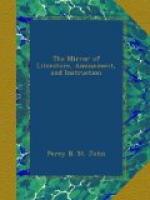August 23. At Galashiels, a semi-rural demi-manufacturing town on the banks of the “braw, braw Gala water.” Not having the good fortune to get to Abbotsford from Melrose, I started over the hill which looks down on Galashiels, towards that destination. Abbotsford I need not render an account of. But my approach to it was not deficient in interest.
On arriving at the summit of the hill overlooking the Tweed, it burst upon my sight. I looked down on the grounds in which it is settled, as on a map. The skill and industry of Sir Walter is not more remarkable in his literary than in his rural works. The house stands in a bare, barren corner of Selkirkshire, (I think) but by admirable management, he has enclosed it with fine, hardy young wood, and quite altered its appearance.
At the bottom of the hill I took the boat at the ferry, and resting in the middle of the stream, the Tweed, and looked around me. I saw a person on the opposite bank appearing and disappearing in the wood which comes down to the water’s edge. I drew near. He was dressed in a short, green coat and cap, and was amusing himself with the antics of a large dog. The place—the time—the air—the gait—every thing conspired: “Who’s that, lassie?” said I to my little boat rower; “That, sir? that’s himsel, that’s the shirra” (sheriff.) Yes, it was the man—he himself—the pride of Scotland—her boast—the intellectual beacon of her hills—it was Sir Walter Scott!
Sept. 3. At Selkirk. At Mitchell’s Inn, where I was introduced to the celebrated Jamie Hogg, the Ettrick Shepherd. He had come, I think, from a fair held at the Eildons. We got over a jug of toddy. Our conversation turned on the church service of the kirk of Scotland, and we rambled into poetry in conversing on the psalms. I pointed out to the shepherd, that a fair fame might be achieved by arranging the Psalms of David, and superseding the barbarities of Sternhold and Hopkins. James maintained that the present edition in use in Scotland, could not be improved. He said that the question had been agitated in the General Assembly, and Sir Walter Scott was applied to, to furnish an improved versification, but he answered, stating that it would be a more difficult matter to get the people to adopt them, than to furnish the same. Any alteration in this respect would be looked upon as little better than sacrilege, and he therefore advised that the present form should be continued in. “Watty’s a sensible chap,” said the shepherd, speaking familiarly of Sir Walter, “and if he laid a finger on o’or venerable psalmody, I wad pitch a louse at him, wha hae ever loved the man as my ain brether.”
* * * * *
During the last years of Sir Walter’s life, he visited in the counties of Berwick, Roxburgh, and Selkirk, the various scenes which his graphic pen has delineated and incorporated in his minstrelsy and romance. The summer when the preceding notes were made, I happened to be in Kelso, and took ride one day to visit the worthy minister of a neighbouring parish, in which the celebrated border keep Smailholme tower is situated, the scene of the fearful legend embodied in the poem “The Eve of St. John.”




